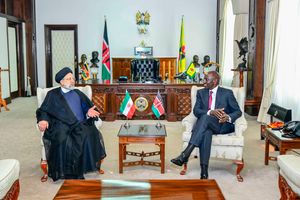University of Nairobi council 'illegal' but remains in place, court rules

The entrance to the University of Nairobi.
Education Cabinet Secretary Ezekiel acted (ultra vires) beyond his powers when he revoked the appointment of the University of Nairobi Council and appointed another to run the institution's affairs, the High Court has ruled.
In a judgment, Justice Jairus Ngaah noted that the Universities Act (2012) limits the Cabinet Secretary's powers to making appointments and not to revoking an appointment already made. However, he dismissed prayers by the Universities Academic Staff Union (Uasu) that the appointment of the council chaired by Prof Amukowa Anangwe be set aside.
The University Council has been embroiled in a public row with the Vice-Chancellor, Stephen Kiama, since last year. The VC applied for a six-month leave of absence, which he later cancelled after only one month and returned to run the university.
Justice Ngaah said if the appointment of Prof Anangwe and members of the council was quashed, it would affect the running of the university. The case was filed by Uasu secretary-general Dr Constantine Wasonga in August last year after Mr Machogu revoked the appointment of Prof Miriam Were as chairperson of the council and six other members in May, barely a year into their three-year term.
The other members of the council appointed by Mr Machogu are Ahmed Sheikh Abdullai, Dr Darmain Ole Warkae, Caren Kerubo Omwenga and Dr Sally Ngeringwony Toroitich.
While Justice Ngaah agreed with Uasu that Mr Machogu's actions contravened the law, he faulted the union for filing its case "late" when the council had already been installed and had begun its work. He noted that members of a university council can only leave office by resignation, by missing three consecutive meetings of the council without the permission of the chairperson, or by being unable to carry out their duties due to prolonged physical or mental incapacity.
A person may also lose their membership of Council if they are declared bankrupt, found guilty of gross misconduct, fail to comply with the requirements of Chapter Six of the Constitution or are convicted of a criminal offence and sentenced to imprisonment for a period of six months or more.
"When the Cabinet Secretary went beyond the scope of his powers as conferred by Section 36 of the Universities Act, it cannot be said with any sense of conviction that he correctly understood the law governing his decision-making power; nor can it be said that he gave effect to it," Justice Ngaah said.
"In arriving at the impugned decision to gazette the persons, the 1st respondent (the CS) acted in an unreasonable and irrational manner in that the 1st respondent did not take into account the fact that the persons he purported to appoint as chairman and members of the council of the interested party had not been interviewed for the said positions," the court said.
However, it allowed the council to remain in office. It blamed Uasu for filing the case under a certificate of urgency three months after the appointments were gazetted.
"The latter (Uasu) may have been lethargic in seeking judicial review relief. The granting of the judicial review reliefs could potentially plunge the UoN into governance chaos. The administration of the UoN would be in limbo if the impugned gazette notice is quashed," Justice Ngaah observed.
Prof Miriam Were, who chaired the defunct council and was joined as an interested party, rejected the suit. The court also faulted Uasu for failing to invite members of the new council who were allegedly ineligible for appointment "to respond to what I consider to be derogatory remarks about their suitability for the office of councillor or chairperson of the council.
Other council members whose appointments were revoked alongside Prof Were are Flora Mutuweta, Charles Orony Ogalo, Alison Kariuki, Engineer Kariuki Muchemi and Hassan Abdi Muhamud.
To grant the application on the basis of the applicant's statements about the current members and the Chairperson of the Council of the UoN would be tantamount to condemning them without hearing them," the ruling said.
"The application would have succeeded but for the lateness of the applicant and the consequences that would flow from granting the reliefs on the basis of a belated application," Justice Ngaah said.




